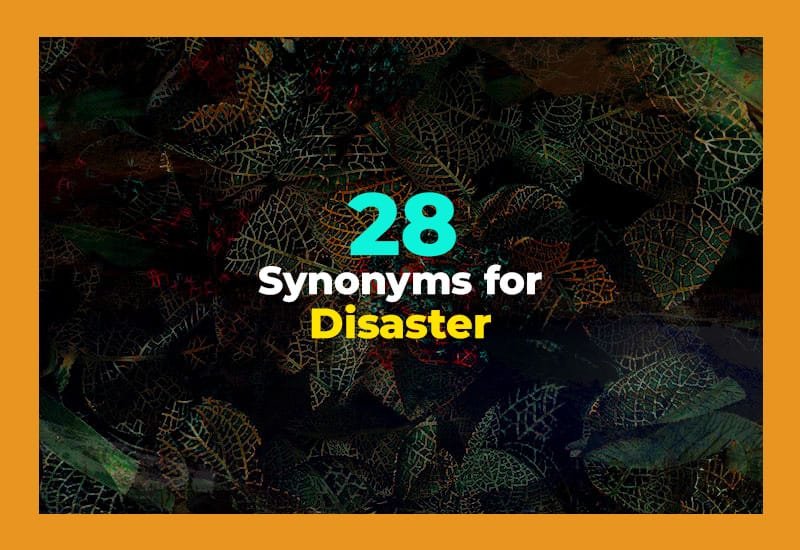When life throws unexpected challenges, the word "disaster" often comes to mind. Words like catastrophe, calamity, and fiasco capture different shades of mishaps, failures, or misfortune. Understanding these alternatives can add color and precision to your writing or conversations. In this article, we'll explore 28 synonyms for disaster, explaining how to use them with real examples.
28 Different Ways to Say DISASTER: Another Word for DISASTER
Catastrophe
Catastrophe is one of the strongest alternatives to disaster. It often implies a sudden and overwhelming event that causes serious damage or loss. You might use catastrophe to describe natural events like hurricanes or human-made failures such as financial collapses. This word works well when you want to convey a dramatic, large-scale impact. It emphasizes severity and urgency, making the situation feel almost impossible to recover from. Catastrophe can be both literal, like an earthquake, or figurative, like a ruined career. Using it communicates gravity in a way that disaster alone might not.
- The earthquake was a catastrophe, leaving thousands homeless.
- Losing the main client turned into a financial catastrophe for the small business.
- The storm caused a catastrophe that affected the entire coastal town.
Calamity
Calamity highlights a tragic event that results in significant suffering or distress. Unlike catastrophe, it often emphasizes the human experience of misfortune rather than just the physical damage. It's useful for both personal and collective situations, from accidents to broader societal struggles. Using calamity in conversation or writing suggests a sense of sorrow or empathy, making it suitable for reflective or serious contexts. It captures the emotional weight behind disasters, showing that misfortunes aren't just events—they affect people deeply.
- The flood was a calamity that displaced hundreds of families.
- Her sudden illness turned into a personal calamity she had to navigate.
- The collapse of the market was a financial calamity for many investors.
Fiasco
Fiasco conveys a situation that fails completely, often in a chaotic or embarrassing way. It works especially well in informal or narrative contexts, where you want to highlight the unexpected failure. While a disaster can be overwhelming, a fiasco often carries a tone of irony or frustration. This synonym captures the sense of plans going horribly wrong despite effort and preparation. Fiasco is versatile because it can describe events, projects, or even performances that collapse spectacularly. It's perfect when failure is messy, visible, and almost theatrical in its impact.
- The launch of the new software turned into a fiasco.
- Their attempt at organizing the festival ended in a complete fiasco.
- The team's strategy meeting was a fiasco from start to finish.
Debacle
Debacle suggests a sudden and humiliating failure. It emphasizes the speed and unexpectedness of the breakdown, making it ideal for situations where things collapse rapidly. Debacle often conveys both practical and reputational damage, highlighting consequences beyond immediate loss. This synonym is commonly used in political, financial, or social contexts but can also fit personal setbacks. Using debacle adds nuance, signaling that the event is chaotic, publicly embarrassing, and difficult to manage. It's a precise word for moments when disaster comes with an added sting.
- The product launch became a debacle after the technical errors.
- The company's merger turned into a debacle within months.
- His speech at the conference ended in a debacle, leaving him red-faced.
Misfortune
Misfortune is a softer synonym for disaster, focusing on bad luck or unfortunate circumstances rather than catastrophic damage. It's ideal for personal or everyday setbacks, emphasizing circumstance over error or negligence. Using misfortune conveys empathy and a less dramatic tone than catastrophe or calamity. It works well in stories or advice, showing that disasters can happen without anyone being at fault. Misfortune highlights the human element of unexpected adversity, reminding readers that setbacks are often part of life.
- Losing her wallet was an unfortunate misfortune during her trip.
- Their car breaking down in the rain felt like a misfortune.
- The missed opportunity was a small misfortune in an otherwise good year.
Havoc
Havoc emphasizes chaos and widespread disruption. It is perfect when a disaster doesn't just cause damage but also creates disorder and confusion. Using havoc suggests a domino effect, where one event triggers multiple problems. This word works in both literal and figurative contexts, from natural disasters to organizational breakdowns. Havoc adds energy to your description, showing that the impact is both messy and extensive. It's a strong choice when you want to capture a sense of turbulence or uncontrolled destruction.
- The storm wreaked havoc across the entire city.
- The hacker's attack caused havoc in the company's computer systems.
- Political unrest created havoc in everyday life for citizens.
Ruin
Ruin focuses on destruction or permanent damage. It works well when something is completely destroyed or rendered unusable. This synonym conveys finality and loss, emphasizing the irreversible consequences of a disaster. Ruin can describe both tangible objects, like buildings, and abstract concepts, such as careers or reputations. Using ruin in writing adds dramatic weight, signaling that the disaster has lasting effects. It's particularly effective when you want to highlight the severity of outcomes and the impossibility of returning to the previous state.
- The fire reduced the historic building to ruin.
- Years of neglect brought the business to ruin.
- His reckless decisions led to the ruin of his reputation.
Collapse
Collapse describes a sudden breakdown or failure. It is ideal for situations where systems, structures, or plans give way unexpectedly. Unlike ruin, collapse can imply a process that unfolds quickly, rather than complete destruction. Using collapse suggests vulnerability and instability, making it suitable for financial, structural, or social contexts. It highlights the fragility of things we often take for granted. Collapse conveys a vivid image of failure, making it a strong alternative to disaster when describing something crumbling under pressure.
- The bridge collapse caused major traffic delays.
- The startup faced collapse after losing investor support.
- Economic policies led to the collapse of local businesses.
Meltdown
Meltdown suggests an intense, often emotional or chaotic breakdown. It works well for both literal disasters, like machinery failures, and figurative ones, such as personal or corporate crises. Using meltdown conveys urgency and a sense of things spiraling out of control. It's particularly effective when describing high-pressure situations where the consequences are visible and dramatic. Meltdown emphasizes instability and loss of control, adding energy to your description. It's a vivid alternative to disaster for highlighting extreme disruption.
- The company faced a meltdown after the product recall.
- She had a meltdown when her carefully planned event fell apart.
- The power grid experienced a meltdown during the heatwave.
Wreck
Wreck implies destruction, ruin, or complete failure. It's often used in physical contexts but works for abstract scenarios like careers or projects. Using wreck emphasizes the aftermath of a disaster and the effort needed to recover. It conveys a sense of irreversible damage or chaos. Wreck is versatile and can communicate both seriousness and impact. This synonym highlights the tangible consequences of a disaster, making it suitable for detailed storytelling.
- The car accident left the vehicle a total wreck.
- The marketing campaign was a wreck, costing the company thousands.
- His reputation was a wreck after the scandal.
Accident
Accident refers to an unintended, often sudden event that causes harm or disruption. It is a less severe alternative to disaster, suitable for situations caused by chance rather than negligence or design. Using accident emphasizes unpredictability and highlights the lack of control involved. This synonym works in daily life, professional settings, or when discussing unexpected events. Accident conveys that misfortune can strike anyone, reinforcing the randomness often associated with disasters.
- The factory fire was a tragic accident.
- She slipped on the icy sidewalk, resulting in an accident.
- The software glitch was an unfortunate accident that delayed the project.
Setback
Setback highlights obstacles that slow progress or create difficulties. It is less extreme than disaster but communicates disappointment and frustration. Using setback emphasizes the challenge and resilience needed to continue rather than the magnitude of destruction. This word is useful in personal, academic, or professional contexts. Setback conveys a pause in progress rather than total failure, making it a relatable term for most readers.
- Missing the deadline was a major setback for the team.
- His injury was a setback in his athletic career.
- The delay in funding created a significant setback for the project.
Blow
Blow conveys a sudden shock or loss, often emotional or financial. It works well when a disaster impacts people personally or professionally. Using blow emphasizes the immediate impact and emotional response rather than physical destruction. This synonym can describe bad news, financial losses, or life-changing events. Blow communicates intensity and abruptness, making it suitable for dramatic storytelling or empathetic writing.
- Losing her job was a huge blow.
- The accident was a serious blow to the community.
- The failed merger delivered a financial blow to investors.
Failure
Failure is a straightforward synonym that emphasizes the inability to achieve a goal. It is often less dramatic than disaster but clearly communicates the collapse of expectations. Using failure works well in professional, academic, or personal contexts. It focuses on the outcome rather than the scale of the event. Failure can carry lessons, making it useful for narratives about growth or learning.
- The project was a complete failure.
- His plan to launch the app ended in failure.
- The test results marked a failure in the new system.
Devastation
Devastation emphasizes severe destruction or overwhelming emotional impact. It works for both physical disasters and emotional events. Using devastation conveys depth and scale, highlighting the extent of damage. It's suitable for natural disasters, societal crises, or personal tragedies. Devastation communicates seriousness and permanence, making it a strong alternative to disaster in intense situations.
- The hurricane left a trail of devastation.
- The loss of their home brought devastation to the family.
- The war caused widespread devastation across the region.
Misadventure
Misadventure highlights an unfortunate or risky experience that went wrong. It is often lighter than disaster but still conveys misfortune. Using misadventure works for stories, travel mishaps, or unexpected challenges. It emphasizes circumstance and risk, adding narrative charm while acknowledging mishap. Misadventure is particularly suitable for storytelling or reflective writing.
- The camping trip turned into a misadventure.
- Their hike became a misadventure due to sudden rain.
- A simple navigation error caused a misadventure during their journey.
Panic
Panic emphasizes fear, confusion, or chaos triggered by sudden events. It works well when a disaster creates immediate emotional or social reactions. Using panic conveys urgency and human response rather than physical damage. This synonym is suitable for emergency situations or tense narratives. Panic communicates the ripple effect of disasters, showing how events impact behavior.
- The fire caused widespread panic among residents.
- The sudden announcement led to panic in the office.
- A security breach created panic throughout the network.
Misery
Misery emphasizes suffering or distress caused by adverse events. It works well when describing emotional or physical hardship resulting from a disaster. Using misery conveys empathy and seriousness, highlighting the human side of misfortune. This synonym is ideal for personal narratives, literature, or reflective writing. Misery captures the toll disasters take on well-being, making it a poignant alternative.
- The famine brought misery to the entire village.
- His financial losses caused deep misery.
- The accident left her in a state of misery for months.
Apocalypse
Apocalypse refers to catastrophic events of extreme scale, often with world-changing consequences. It works best in dramatic or literary contexts. Using apocalypse conveys intensity, urgency, and irreversibility. This synonym can describe literal, fictional, or figurative disasters. Apocalypse communicates the ultimate scope of destruction, making it perfect for extreme or imaginative scenarios.
- The volcanic eruption felt like an apocalypse.
- Some fear climate change could lead to an apocalypse.
- The collapse of the city's infrastructure was an apocalypse in its own right.
Hardship
Hardship emphasizes the challenges, suffering, or adversity caused by difficult events. It is less dramatic than catastrophe but communicates serious struggle. Using hardship highlights endurance and resilience rather than just failure. This synonym works well in personal, historical, or societal contexts. Hardship reflects the lived experience of disasters, making it a thoughtful alternative.
- The refugees endured years of hardship.
- Financial hardship made it difficult for the family to recover.
- The drought brought hardship to local farmers.
Emergency
Emergency highlights a situation requiring immediate action. It conveys urgency and seriousness, often in practical or official contexts. Using emergency emphasizes the need for response rather than the emotional or long-term consequences. This synonym is ideal for safety, medical, or crisis situations. Emergency communicates immediacy, making it a functional alternative to disaster.
- The flood created a medical emergency.
- A fire in the building turned into a full-scale emergency.
- The sudden collapse required emergency services immediately.
Crisis
Crisis highlights a critical point where immediate decisions or actions are necessary. It works well for political, financial, or personal disasters. Using crisis conveys tension, urgency, and high stakes. This synonym emphasizes problem-solving under pressure, making it versatile for writing and conversation. Crisis communicates intensity and decision-making importance in response to disaster.
- The government faced an economic crisis.
- Her health crisis required immediate attention.
- The company navigated a PR crisis after the scandal.
Upheaval
Upheaval emphasizes disruption, change, and disorder. It is ideal for social, political, or personal contexts where disaster shakes established systems. Using upheaval conveys transformation, stress, and unpredictability. This synonym highlights both the event and its consequences, making it rich for descriptive writing. Upheaval communicates instability while reflecting the broad impact of disasters.
- The revolution caused social upheaval across the nation.
- Economic upheaval led to widespread job loss.
- The sudden policy changes created political upheaval.
Breakdown
Breakdown describes the failure of a system, structure, or process. It works well in technical, organizational, or emotional contexts. Using breakdown conveys that something no longer functions as intended. This synonym emphasizes disruption and vulnerability. Breakdown is effective when describing situations where disaster emerges gradually or structurally rather than suddenly.
- The power grid experienced a breakdown during the storm.
- The team faced a breakdown in communication.
- His emotional breakdown followed weeks of stress.
Shock
Shock emphasizes surprise, trauma, or intense reaction to unexpected events. It works well when a disaster creates immediate emotional impact. Using shock highlights suddenness and psychological effect. This synonym is suitable for personal experiences, news events, or narrative storytelling. Shock conveys the human response, making it a vivid alternative to disaster.
- The sudden death caused widespread shock.
- The scandal sent shock through the community.
- The news of the accident left her in shock.
Mishap
Mishap is a light-to-moderate synonym for disaster, often implying accidental or minor misfortune. It is suitable for everyday scenarios without overwhelming consequences. Using mishap emphasizes unpredictability and small-scale failure. This synonym works well in conversational, humorous, or narrative contexts. Mishap communicates that not all disasters are catastrophic, making it relatable.
- The kitchen fire was a minor mishap.
- A small mishap delayed the event by an hour.
- His tripping over the curb was an embarrassing mishap.
Synonym Table
| Synonym | Example |
|---|---|
| Catastrophe | The earthquake was a catastrophe, leaving thousands homeless. |
| Calamity | The flood was a calamity that displaced hundreds of families. |
| Fiasco | The launch of the new software turned into a fiasco. |
| Debacle | The company's merger turned into a debacle within months. |
| Misfortune | Losing her wallet was an unfortunate misfortune during her trip. |
| Havoc | The storm wreaked havoc across the entire city. |
| Ruin | The fire reduced the historic building to ruin. |
| Collapse | The bridge collapse caused major traffic delays. |
| Meltdown | The company faced a meltdown after the product recall. |
| Wreck | The car accident left the vehicle a total wreck. |
| Accident | The factory fire was a tragic accident. |
| Setback | Missing the deadline was a major setback for the team. |
| Blow | Losing her job was a huge blow. |
| Failure | The project was a complete failure. |
| Devastation | The hurricane left a trail of devastation. |
| Misadventure | The camping trip turned into a misadventure. |
| Panic | The fire caused widespread panic among residents. |
| Misery | The famine brought misery to the entire village. |
| Apocalypse | The volcanic eruption felt like an apocalypse. |
| Hardship | The refugees endured years of hardship. |
| Emergency | The flood created a medical emergency. |
| Crisis | The government faced an economic crisis. |
| Upheaval | The revolution caused social upheaval across the nation. |
| Breakdown | The power grid experienced a breakdown during the storm. |
| Shock | The sudden death caused widespread shock. |
| Mishap | The kitchen fire was a minor mishap. |

Final Thoughts
I hope this list helps you see how rich and varied the English language can be when describing misfortune. Each synonym carries its own nuance, making it possible to express small mishaps or world-shaking disasters accurately. Choosing the right word can enhance storytelling, communication, or writing clarity, and give readers a vivid sense of the impact. Keep these alternatives handy for both writing and conversation to convey your message precisely.









